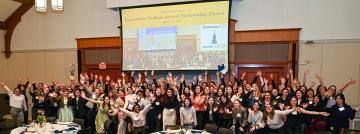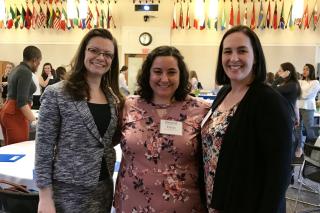“I tell prospective students that their choice of college is precious,” says Associate Professor Masato Aoki. “College presents the best opportunity to figure out what difference they want to make in the world, and prepares them to make that difference. Helping students find their way after graduation has been my life’s work.”
To accomplish this goal, Aoki collaborates with faculty in the BA in Economics Degree and the Economics Student Liaison to organize ECONnect, a career preparation program which integrates a loyal and enthusiastic Economic alumnae/i community. We recently spoke to Aoki about what led him to teach Economics, and how ECONnect supports students during their studies and after graduation.
A Dedication to Economics and Social Justice
Aoki began his formal education as a pre-med major at Bucknell University in Pennsylvania. As his father was a pioneer in cancer immunology research, Aoki recalls, “My parents’ house guests were almost exclusively medical researchers from Japan or the National Institutes of Health. As a result, my understanding of the menu of career paths was very limited.”
He lacked the passion required to excel in pre-med courses, but an introductory course in economics piqued his interest.
“[I realized that] as a consumer, I’m already a participant in the economy,” says Aoki. “College [would prepare] me to contribute as a worker in the economy, and studying economics would help me understand this complex system I would enter as an independent and hopefully self-supporting [individual] after graduation.”
Upon graduating high school, Aoki had an “embarrassingly narrow awareness of how big the world is and its many social problems,” he says. “Fortunately for me, economics at Bucknell had a social justice orientation, and the faculty wanted to make sure their students were at least aware of grievous economic injustice around the world.”
That passion for social justice continues in his teaching today; Aoki uses economics to shed light on how different sectors of the population are impacted by economic policies and trends.
For example, his introductory Economics courses include a unit that examines what we can learn from the COVID–19 pandemic about economic inequality (ECON 100 Principles of Microeconomics) and employment trends (ECON 101 Principles of Macroeconomics). He also teaches two courses in political economy, which examine the intersection of class and race in the economic system (ECON 225 Political Economy of U.S. Capitalism) and the educational system (ECON 255 Political Economy of Education).
What Can You Do with an Economics Degree?
While the job title of “economist” is rare, “the analytical skills and institutional knowledge our graduates learn in Economics prepare them to work in a wide variety of sectors and positions,” says Aoki. More importantly, Aoki is eager to share the versatility of the degree.
He notes that Economics alumnae/i work in a wide array of sectors, including finance, law, public policy, and business analysis. Many have acquired advanced degrees, including JD, PhD, MA/MS, and MBA.

What better way for students to learn about the possibilities than from alumnae/i currently in the field? That idea inspired Aoki to organize the first ECONnect event in 2001: an annual student-alumni Networking Dinner. Twenty-five years later, the event annually connects approximately 50 alumnae/i and 50 current students with majors or minors in economics, as well as students registered for economics courses that fall or spring. This year, the opportunity to network with Economics alumnae/i will be open to all interested students.
“I saw building a student-alumnae/i network as a way for Simmons to distinguish itself,” Aoki recalls. “If I can give my students an edge, it’s with this alumnae/i network. We held the first dinner in 2001. The students dressed up; they were excited to meet their ‘older sisters.’...I love watching the students' faces when there is a scream of joy and a hug [between alumnae/i]. I can see them thinking, ‘is that me [and my friends] 10 years from now?’ It’s a wonderful scene.”
At the Networking Dinner, the seating arrangement is organized by the alumnae/i’s professional sector and the students' area of interest. At last year’s event, there were tables for analyst, consulting, education, finance, government, international, law, management, media and marketing, nonprofit, and public policy.
For Aoki, the results are evident: “Each year, after the dinner, I hear students say with excitement, ‘I didn’t know that job existed!’ or ‘An alum invited me to lunch, so I can learn more about her career.’”
ECONnect Prepares Students for Careers
The ECONnect program also includes four alumnae/i-led workshops throughout the year, organized with the Economics Liaison. One of these, held a week before the Dinner, is the “Networkshop,” where students learn about the power of a good elevator speech, that networking is relationship-building for mutual benefit, and that when networking one should seek A.I.R: advice, information, and referrals.
Other workshops, held throughout the year, include mock interview sessions, an overview of how to select and apply to graduate programs, and a session on “financial adulting” that covers how to budget, invest, and manage student debt.
“The ECONnect program fosters professional and mentoring relationships between our students and the engaged and loyal Economics alumni community,” says Aoki. “It expands their view of professional options and inspires their exploration of career paths.”
In addition, every student who attends the Networking Dinner receives a directory of all alumnae/i in attendance, as well as others who could not attend but are willing to be contacted.
“The directory is worth its weight in gold. Such a rich trove of contacts and career path information. Every year, students tell me that it expands their idea of what they can do with an economics major. It’s an antidote to tunnel vision,” Aoki says.
At the event, alumnae/i are given the opportunity to share 30-second “pearls” of wisdom and advice with students.
“These alumni are the big sisters you didn’t know you have,” Aoki tells students. “They remember what it was like to be a junior or senior and wondering, what am I going to do when I leave the cocoon of Simmons? Students come out of the networking dinner saying that they feel less lonely in that process of figuring out what they want to do.”
Whether connecting with faculty or with alumnae/i at the Networking Dinner, the experiences offered at Simmons can be life-changing.
“For our students to see successful women makes them think, ‘yes, I can do this. I can be the pioneer woman at this company.’ Students gain self confidence, surrounded by wonderful role models. To see the self-confident alumnae/i come back and talk about their progression to a leadership position, or their experience in graduate school, it encourages students to ask questions and get practical advice,” Aoki says.
The Networking Dinner is also a good reminder of the support Simmons faculty offer alumnae/i.
“Around 25 [years old], some alumnae/i experience a ‘quarter life crisis,’ marked by dissatisfaction with the career path they entered upon graduation. They reach out to their former economics professors for networking…Faculty broker relationships between these and other alumnae/i and associates,” he says. “If you’re looking to work in a particular area, I may know someone in that area who you could connect with. It’s about developing a professional network.”
Empowering Women in Economics
Beyond ECONnect, Aoki is confident that Simmons offers a unique perspective on economics.
“At Simmons, the faculty will take you seriously, so you should take yourself seriously, too. This faculty is dedicated to teaching to a women-centered audience, including in male-dominated fields,” he observes. “It’s important to know how to teach to this audience, many of whom have been victimized by teachers who fostered math phobia. Over the years I’ve found that women want practical applications more than abstract theory.”
That difference is reflected in the diverse roles graduates have found in the field.
“Alumnae/i can tell the difference between [Simmons graduates] and their colleagues who attended co-ed universities. Our students aren’t completely insulated, they interact with students from co-ed institutions in their internships and part-time jobs. But once in the field, they know how to represent themselves, and how to stand up for other women,” Aoki says.

